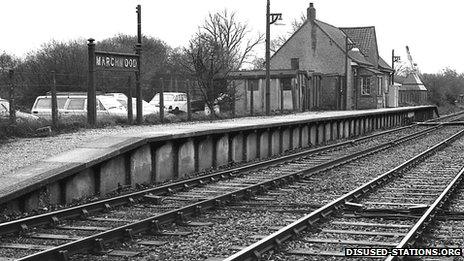Waterside Totton and Hythe rail plan shelved
- Published
A Hampshire County Council report said it would cost £900,000 a year to run the scheme
Plans to reopen a freight railway line near Southampton to passenger trains have been shelved over cost concerns.
Hampshire County Council considered using the line, between Totton and Hythe, for commuter and tourist services.
A council report came down against progressing with the scheme, which would cost £900,000 a year to run.
Campaigners said the environmental and social benefits of the proposals were not being taken into account.
The six-mile (10km) Waterside line is currently only used by freight trains serving the Fawley oil refinery complex. It was last used by passenger trains in 1966.
The capital cost of reinstating the line to accommodate passenger trains was estimated at about £17m for relaying track, installing new signalling at Totton and building new platforms at Hythe and Totton.
The scheme would involve a single two-car Class 158 diesel train making one round trip an hour between Hythe and all stations to Eastleigh, including Southampton Central.
'Terrific asset'
The council report, external was against committing further funding for the scheme due to the "poor value for money business case", although it said the authority should review the position should local circumstances change.
Local campaigners maintained that a passenger service would cut congestion on routes in Waterside and allow tourists to access the nearby New Forest National Park.

The line through Marchwood was last used by passenger trains in 1966
Liberal Democrat councillor and member of the New Forest National Park Authority, David Harrison said: "A railway would be a terrific asset to the Waterside community. I think it is inevitable we will see it - I just want it in a shorter timeframe."
He said the report was based on a "false premise" in concentrating on the financial costs and not surveying the opinions of local people.
He also called on the council to investigate alternative sources of funding including the European Union and Local Enterprise Partnerships.
The decision to shelve the plans was ratified by Sean Woodward, executive member for economy, transport and environment.
- Published21 January 2014